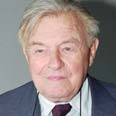
Former Jerusalem Mayor Kollek dies at 95
He ruled the capital for nearly three decades, and dictated a sense of tense coexistence between its residents; he began his political path with Rafi, ended it in a failed race against Olmert; the life of Teddy Kollek
Teddy Kollek, Jerusalem's legendary mayor, died at his apartment at the Hod Yerushalayim retirement home in the Kiryat Yovel neighborhood in the city Tuesday morning.
Kollek will be laid to rest on Thursday at the Mount Herzl cemetery in Jerusalem. his coffin will be placed at the Safra Square in Jerusalem Thursday morning, before the funeral procession starts making its way to the cemetery.
Jerusalem Mayor Uri Lupolianski expressed deep sorrow over Kollek's death, and said, "Teddy was Jerusalem and Jerusalem was Teddy. He embodied in his spirit and his personality the true unification of Jerusalem, the capital of the State of Israel."
“I’m fine, and Jerusalem is fine too.” That sentence, which he said to his friends at one of his final birthdays, says a lot about how inseparable Teddy Kollek and Jerusalem were.
The tough guy, the legend with a cigar in his mouth, headed the city for 28 years and became not only Jerusalem’s longest running mayor, but one identified with co-existence and compromise between such opposing sectors – Jews and Arabs, haredim and secular, Muslim, Christian, and Jews.
Only Teddy could have led this mix called Jerusalem, a city sacred to three religions and a barrel of explosives.
Theodore (Teddy) Kollek was born in Austria in 1911. He made aliyah to Israel with his wife Tamar in 1934, and was one of the founders of kibbutz Ein Gev.
Kollek fulfilled a series of prominent positions in the Haganah and the Jewish Agency's political department.
While he was working at the Jewish Agency, Kollek took part in negotiations with the Nazis in Germany over the rescuing of Jews.
Young Kollek was appointed head of the Haganah’s purchasing delegation in the United States, helped in establishing Israel Bonds, and contributed to the relationship between Israel and the US’s intelligence agencies.
Following Israel’s establishment, Kollek served as an envoy in Washington, and was the powerful general director at the prime minister’s office between 1952 and 1964.
During a small break from the political life, he established the Israel Museum. Following that endeavor, he joined David Ben Gurion in establishing Rafi, a Knesset party formed in 1965.
United Jerusalem
Beginning with Rafi, his political path led him to the labor party, and then to the top of list for the Jerusalem City Council. He was first elected mayor in 1965, and continued to head Jerusalem for nearly three decades.
Kollek became known worldwide after the 1967 unification of Jerusalem following the Six Day War. He was considered a man who left his mark on the city and succeeded in maintaining the sensitive balance between the varied sectors in his city.
He did not believe in dividing up Jerusalem in future agreements with the Palestinians, but he supported granting extensive managerial authority to each of the sides in the cities four quarters.
“In any case, Jerusalem is a problem for two or three generations. Everything has to be done in agreement.”
'Olmert sank Jerusalem'
In 1993, Kollek ran for mayor for the last time, and lost to the Likud candidate, Prime Minister Ehud Olmert. It was a dirty campaign in which Kollek’s age – then 80 – was used by Olmert and his aides as a deterrent in electing him, with the slogan, “Because everyone knows it’s about time”.
The age campaign did its job. “I felt great and I could have continued,” Kollek said. “If they didn’t keep mentioning my age all the time, I would have won.” Following the loss, Kollek retired from political activity.
He did not particularly like his successor, and spoke of him several years ago saying that he wasn’t a good Mayor. “During Olmert’s time, the city sank. He always wanted to be prime minister,” Kolleck said.
During his last years, Kollek dedicated himself to fundraising for the Jerusalem Foundation and activities for the city.
Jerusalem's new soccer stadium was named after him, 'Teddy Stadium'. Kollek was also the honorary president of the Israel Museum and Israel Prize laureate in 1988 for his contribution to the State of Israel.
Kollek's son is director Amos Kollek.
Neta Sela and Efrat Weiss contributed to the report











